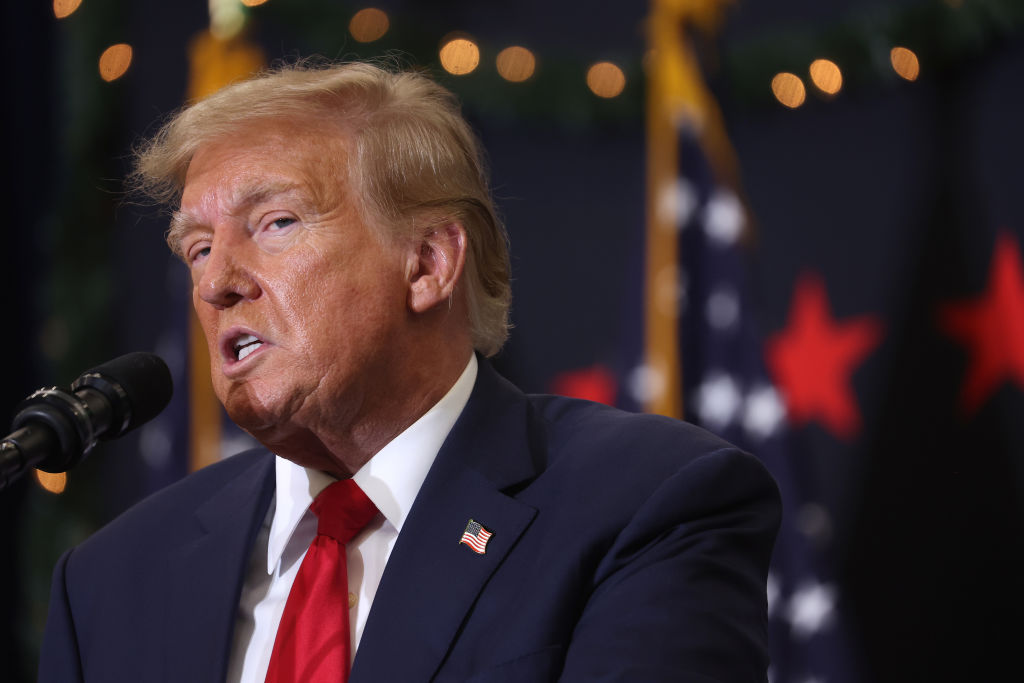Happy Wednesday! We hope you haven’t lost sight of just how insane the next 11 months are going to be.
Quick Hits: Today’s Top Stories
- The Colorado Supreme Court ruled Tuesday night that former President Donald Trump could not appear on the state’s 2024 presidential ballot, holding that the 14th Amendment’s insurrection clause applied to his actions on January 6, 2021. “President Trump incited and encouraged the use of violence and lawless action to disrupt the peaceful transfer of power,” the court wrote as part of a 4-3 ruling. “The tenor of President Trump’s messages to his supporters in exhorting them to travel to Washington, D.C., on January 6 was obvious and unmistakable: the allegedly rigged election was an act of war and those victimized by it had an obligation to fight back and to fight aggressively. And President Trump’s supporters did not miss or misunderstand the message: the cavalry was coming to fight.” The Colorado justices acknowledged that they did not “reach these conclusions lightly,” but the ruling applies to both the 2024 primary and general election ballots—and could prompt the U.S. Supreme Court to offer a ruling on the 14th Amendment question, as several other states consider the issue. The former president has until January 4 to appeal the ruling, and he plans to do so. “The Colorado Supreme Court issued a completely flawed decision tonight and we will swiftly file an appeal to the United States Supreme Court and a concurrent request for a stay of this deeply undemocratic decision,” Trump campaign spokesman Steven Cheung said in a statement yesterday. “We have full confidence that the U.S. Supreme Court will quickly rule in our favor and finally put an end to these unAmerican lawsuits.” Multiple congressional Republicans rebuked the ruling, and GOP Sen. Thom Tillis of North Carolina introduced legislation Tuesday that would punish states for “misusing the Fourteenth Amendment for political purposes.”
- Israeli President Isaac Herzog told a group of nearly 80 foreign ambassadors on Tuesday that Israel was ready to negotiate a second truce in its war against Hamas in exchange for the release of more hostages. “I can reiterate the fact that Israel is ready for another humanitarian pause and additional humanitarian aid in order to enable the release of hostages,” said Herzog. “And the responsibility lies fully with [Hamas’ leader Yahya] Sinwar and the leadership of Hamas.” Israel’s offer reportedly includes a one-week pause in fighting and the release of additional Palestinians prisoners convicted of violent crimes in exchange for the release of about 40 of the estimated 129 hostages still in Hamas captivity, including women, elderly men, and the sick or injured.
- The American Civil Liberties Union (ACLU) and the Texas Civil Rights Project sued the state of Texas on Tuesday over Senate Bill 4, which allows state police to arrest immigrants suspected of crossing the southern border illegally. Texas Gov. Greg Abbott signed the bill into law on Monday, and defended the measure in a statement to Politico. “President Biden has repeatedly refused to enforce federal immigration laws already on the books and do his job to secure the border,” he said. “In his absence, Texas has the constitutional authority to secure our border through historic laws like SB 4,” Mexican President Andrés Manuel López Obrador stated yesterday that he will also challenge the new law. Citing U.S. Customs and Border Protection (CBP) sources, NewsNation reported Tuesday that more than 12,500 migrants were encountered at the southern border on Monday—the highest such single-day tally on record. “Our officers and agents are responding to large groups of migrants, which means that some of our agents aren’t on the line, not really monitoring for some of those cuts,” acting CBP Commissioner Troy Miller said this week. “If we don’t have anybody to respond, then you’re going to see what you’re seeing.”
- Google agreed to pay $700 million and restructure its Google Play store app to allow for increased competition, according to an antitrust settlement filed in a San Francisco federal court Monday. State attorneys general alleged that Google stifled competition by forcing consumers into a payment processing system that drove up prices for applications downloaded through the Play store. All 50 states, as well as the District of Columbia, the Virgin Islands, and Puerto Rico, joined the settlement, and eligible individuals will receive at least $2 as part of the ruling.
Campaigning in the Key of Trump

Seven years ago, Pittsburgh-based writer Salena Zito first coined the idea that then-Republican presidential candidate Donald Trump’s most extreme rhetoric should be taken seriously, but not literally. That observation, published less than two months before the 2016 election, seemed like a prescient heuristic for explaining Trump’s relationship to both the press and his supporters. As the media closely covered Trump’s inflammatory rhetoric and myriad falsehoods on the campaign trail, they often missed his visceral connection with voters that propelled him to victory. But there were always flaws in deploying that framework to evaluate a sitting head of state—not the least of which is the fact that a president’s words are often considered policy in and of themselves.
Two impeachments and one attempted electoral overthrow later, the question of how to treat candidate Trump’s unhinged statements in 2023 is plaguing the political world with renewed vigor. In recent months, the former president has doubled down on extreme rhetoric about immigrants and his political adversaries, and has even joked about becoming a dictator—only on “day one”—if elected again. Amid the barrage of statements, Trump’s opponents and allies alike are still debating what weight the former president’s words carry.
We at The Dispatch have had plenty of debates over the past few years over how best to cover the former—and potential future—president. Do we pay attention to every single outrageous thing he says or does, potentially overinflating his relevance and missing the forest for the trees? Or do we ignore all but the most incendiary rhetoric, and risk leaving voters uninformed about what the odds-on favorite to be the next president is saying he plans to do in office?
At least here in TMD, we’ve trended toward the latter camp.* But it may be time to rethink that approach. In the GOP presidential primary, Trump is up by 50 points nationally, 32 points in Iowa, and 23 points in New Hampshire, according to RealClearPolitics’ polling averages. He leads President Joe Biden by 3 points nationally in those same averages, and successive polls have shown Trump beating Biden handily in key battleground states. Although Democratic strategists hope their voters will turn out for Biden next November, it’s not looking good for the incumbent less than a year out. Add in yesterday’s Colorado Supreme Court ruling that may have locked up the GOP nomination for Trump, and it might be time to start taking him both seriously and literally again.
Case in point: Trump’s comments last night at an Iowa campaign event. “It’s true; they’re destroying the blood of our country,” Trump said of illegal immigrants. “They’re destroying our country. They don’t like it when I said that—and I never read Mein Kampf. They said, ‘Oh Hitler said that,’ [but] in a much different way.”
It isn’t the first time Trump has spoken about immigrants poisoning the country’s blood—he made the same comments in a speech on Saturday and on his Truth Social account. He’s used that rhetoric dating back to a September interview with the National Pulse. “It’s poisoning the blood of our country,” he said. “People are coming in with disease, people are coming in with every possible thing that you can have.” The earlier comments drew condemnation for the parallels to Adolf Hitler’s writings about the poison of non-Aryan blood, though Trump’s campaign denied such allegations. “That’s a normal phrase that is used in everyday life,” Trump spokesperson Steven Cheung said in a statement. “In books, television, movies, and in news articles.”
(To be fair, it is used in at least one book. When asked whether he stands by the characterization of the statement as “normal,” Cheung told TMD, “Trump gave a great speech,” referencing Saturday’s remarks. He also contrasted Trump’s remarks with those of the “mainstream media and academia at-large who have given safe haven for dangerous anti-Semitic and Pro-Hamas rhetoric.”)
These echoes of blood-and-soil nationalism highlight the differences between what Trump is openly espousing today and how he ran his first two campaigns. The former president always had a penchant for anti-immigrant rhetoric, but that was back when you weren’t supposed to take his words literally. Trump’s speeches—like his July 2017 speech in Poland that was lauded by some conservatives and condemned by some on the left as “alt-right”—praising the value of the nation-state, patriotism, and Western civilization was the serious stuff. Trump’s 2024 pitch to his supporters has been much darker. As Florida Gov. Ron DeSantis said in October, “This is a different Donald Trump than 2015 and 2016.”
In a Fox News town hall earlier this month, Sean Hannity served up a softball to the former president, asking: “Under no circumstances, you are promising America tonight that you would never abuse power as retribution against anyone?”
“Except for day one,” Trump replied, saying he wanted to use that power to close the border and drill for oil. “I love this guy. He says, ‘You’re not going to be a dictator, are you?’ I said, ‘No, no, no. Other than day one.’ We’re closing the border, and we’re drilling, drilling, drilling. After that, I’m not a dictator.”
Trump made similarly inflammatory comments last month in a Veterans Day speech. “We pledge to you,” he told his supporters, “that we will root out the communists, Marxists, fascists and the radical left thugs that live like vermin within the confines of our country that lie and steal and cheat on elections.” Trump also signaled in November that he’d use the Justice Department and the FBI to go after his political opponents as payback for the indictments he’s facing. In September, he suggested that his former Joint Chiefs of Staff chairman, Mark Milley, deserved to be put to death. His 2024 campaign is explicitly premised on retribution—just over a year ago, he called for suspending the Constitution because the 2020 election was fraudulent.
What are voters to make of such comments? With a figure like Trump, it’s always challenging to tell if he really means what he’s saying or if he’s just pushing the envelope to gin up media coverage or project what he perceives as toughness. Sen. Mitt Romney said recently he didn’t take Trump’s dictator comments “seriously or literally.” In a separate interview, he elaborated: “Donald Trump is kind of a human gumball machine, which is a thought or a notion comes in and it comes out of his mouth,” Romney told NBC News last week. “I don’t attach an enormous amount of impact to the particular words that come out and try and evaluate each one of them. I do think you can look at his record as president, and particularly in the last months of presidency, and say this is a dangerous approach, this is an authoritarian approach. That gives me far more concern than him playing to the crowd.”
Other GOP lawmakers’ responses to Trump’s “poisoning the blood” comments range from disapproval, to indifference, to anger—that he didn’t go far enough. North Carolina Sen. Thom Tillis said, “It’s unhelpful rhetoric.” Sen. Shelley Moore Capito of West Virginia said, “Obviously, I don’t agree with that,” adding that “it’s just part of his campaign rhetoric, I guess. I don’t know, I can’t explain it.” Minority Leader Mitch McConnell didn’t explicitly condemn the remarks, but knocked Trump yesterday, referencing the appointment of his Asian-American wife to Trump’s cabinet. “Well, it strikes me it didn’t bother him when he appointed Elaine Chao secretary of transportation,” he said. But Sen. Lindsay Graham told NBC News, “I could care less,” citing the record number of illegal crossings at the border. “I’m mad he wasn’t tougher than that,” said Sen. Tommy Tuberville, “because have you seen what’s happening at the border? We’re being overrun. They’re taking us over.”
Multiple Republican lawmakers, including Sen. J.D. Vance, engaged in some mental gymnastics to claim Trump’s comments were taken out of context. “He didn’t say immigrants were poisoning the blood of this country,” Vance argued. “He said illegal immigrants were poisoning the blood of this country, which is objectively and obviously true to anybody who looks at the statistics about fentanyl overdoses.”
Trump’s primary challengers have mostly opted out of condemning his rhetoric. “I don’t know what this means with the blood stuff,” DeSantis said on Monday. “I know people are trying to draw historical allusions. I don’t know if that’s what he meant.” When ABC News’ Jonathan Karl asked former U.N. Ambassador Nikki Haley last weekend about Trump saying he’ll use the justice system to target his political enemies, Haley responded by saying the media “is exhausting in their obsession with” Trump—though she later knocked her chief rival on national security for his praise of authoritarian leaders in the past. Former New Jersey Gov. Chris Christie remains the sole serious 2024 challenger in the race to forcefully condemn Trump. “He’s disgusting,” Christie said on Sunday. “What he’s doing is dog-whistling to Americans who feel absolutely under stress and strain from the economy and from the conflicts around the world, and he’s dog-whistling to blame it on people from areas who don’t look like us.”
The question remains: Will Trump act on his words if given the chance? Advisers close to the former president think he will, and they’re preparing for it. Stephen Miller, a former White House aide and Trump adviser on immigration, told the New York Times last month that Trump’s team is planning an immigration crackdown “blitz” using executive authority—immigration policy meets flooding the zone. “Any activists who doubt President Trump’s resolve in the slightest are making a drastic error: Trump will unleash the vast arsenal of federal powers to implement the most spectacular migration crackdown,” Miller said. Plans include ending birthright citizenship for children born to illegal immigrants in the U.S. and “the largest domestic deportation operation in American history,” based on President Dwight Eisenhower’s “Operation Wetback”—a 1954 mass deportation campaign that removed hundreds of thousands of illegal immigrants to Mexico. While campaigning in 2015, Trump said he’d deport 11 million immigrants. This time, Trump’s allies want to make sure they have the strategy and the staff to follow through.
Personnel is policy, and Trumpworld has taken that to heart when planning for 2024. The Heritage Foundation’s “Project 2025” is ostensibly a policy transition plan for whoever becomes the next “conservative president,” but the project has been led by former Trump administration officials who want “to bend or break the bureaucracy to the presidential will.” Project 2025 is also recruiting a bank of ideologically aligned staff. A screening questionnaire for their personnel database includes questions about whether legal immigration should be increased, whether “the U.S. has the right to select immigrants based on the country of origin,” and whether “the president should be able to advance his/her agenda through the bureaucracy without hindrance from unelected federal officials.” Russ Vought, the director of the Office Management and Budget during the Trump administration, contributed to the project, writing in its nearly 900-page Mandate for Leadership. “The great challenge confronting a conservative president,” it reads, “is the existential need for aggressive use of the vast powers of the executive branch to return power—including power currently held by the executive branch—to the American people.”
It’s unlikely Trump will make the same “mistake” a second time of hiring people like Gen. Milley, Gen. John Kelly, or Bill Barr—the so-called adults in the room—in a second administration. He’s reportedly focused on staffing his next White House with true loyalists. The waning days of his first term, when high-level officials headed for the door as the president continued to claim the election was stolen, offered a glimpse of who could be in charge of key posts and the potential consequences. During Trump’s 2020 lame-duck period, for example, Johnny McEntee—the young director of the White House Presidential Personnel Office responsible for rooting out staff considered insufficiently loyal to Trump—drafted and got Trump to sign a presidential directive ordering the complete U.S. withdrawal from Afghanistan and Somalia before the end of Trump’s term, without consulting the acting defense secretary or the Joint Chiefs of Staff. The order sparked a mini-crisis among military officials unsure if the directive was legitimate or fraudulent before they finally spoke with Trump, and he rescinded the directive. McEntee is now a senior adviser to Project 2025.
Kash Patel, a Trump loyalist who briefly served as the chief of staff to the acting defense secretary beginning in November 2020, after Mark Esper was fired, is expected to serve in the next Trump administration—potentially as CIA director. “We will go out and find the conspirators not just in government, but in the media,” Patel told Steve Bannon on the War Room podcast earlier this month. “The one thing we learned in the Trump administration the first go round is we gotta put in all American patriots top to bottom. And we got them for law enforcement. We got them for intel collection. We got them for offensive operations. We got them for DOD, CIA, everywhere.”
Packing the executive branch with sycophants doesn’t suddenly remove all the checks on presidential action. But there’s legitimate debate over how well those checks will function with little to no appetite from Republicans in Congress to question the actions of the former president. And it’s not just a lack of appetite that keeps elected Republicans in line—some GOP lawmakers reportedly decided not to vote for Trump’s second impeachment out of fear for their families’ safety.
Ultimately, the best predictor of how Trump will act in a second term is how he acted during his first, which ended on the Ellipse with the former president telling his supporters to “fight like hell” and to head to the Capitol.
Some of those supporters took his words quite literally.
Worth Your Time
- For non-lawyers trying to unpack the Colorado Supreme Court’s ruling that disqualified former President Trump from the state’s 2024 ballots, an October episode of Advisory Opinions—featuring a conversation between David, Sarah, and one of the law professors whose law review article set off this whole saga—goes a long way in explaining Section 3 of the 14th Amendment. “This is just a rule, a qualification for who can hold office, like the rule that you have to be a natural-born citizen to be president, or you can’t be president if you were already president for two terms,” argued William Baude, a law professor at the University of Chicago Law School and the director of its Constitutional Law Institute. “It’s not something that has to be imposed on you. Like in the wake of January 6, there were people who said, ‘Oh, Congress should activate Section 3 somehow. We should use Section 3.’ Or there are people who think maybe if you’re convicted for the federal crime of incitement of insurrection, maybe that activates Section 3. And the point is, Section 3 is already activated. It just has a rule. It says, if you did the thing, you can’t have the office.” Several people worked very hard last night so that we could publish a transcript of the conversation this morning, as well.
Presented Without Comment
Politico: Trump Calls for Primary Challenge Against Texas GOP Lawmaker [Rep. Chip Roy]—Despite Passed Deadline
Also Also Presented Without Comment
Mediaite: Pro-[Nikki] Haley PAC Releases Ad Featuring Literal Dumpster Fire Representing DeSantis Campaign
Toeing the Company Line
- Houthi attacks in the Red Sea and the weirdness of the 2024 GOP presidential primary—Kevin, Mike, Drucker, and special guest and president of the Middle East Forum Daniel Pipes discussed all that and more on last night’s Dispatch Live (🔒). Members who missed the conversation can catch a rerun—either video or audio-only—by clicking here.
- In the newsletters: Nick tried to make sense (🔒) of the unpollable 2024 election.
- On the site today: Charlotte reports on the ongoing Israeli refugee crisis in the wake of Hamas’ 10/7 attacks and Jonah tackles antisemitism on the Left.
Let Us Know
How do you think The Dispatch should cover Donald Trump as he seems increasingly likely to be the Republican nominee in 2024? Should we take his words seriously? Literally? Both?
Clarification, December 20, 2023: Originally, this newsletter mistakenly used the word “former” when it should have read “latter.”





Please note that we at The Dispatch hold ourselves, our work, and our commenters to a higher standard than other places on the internet. We welcome comments that foster genuine debate or discussion—including comments critical of us or our work—but responses that include ad hominem attacks on fellow Dispatch members or are intended to stoke fear and anger may be moderated.
With your membership, you only have the ability to comment on The Morning Dispatch articles. Consider upgrading to join the conversation everywhere.